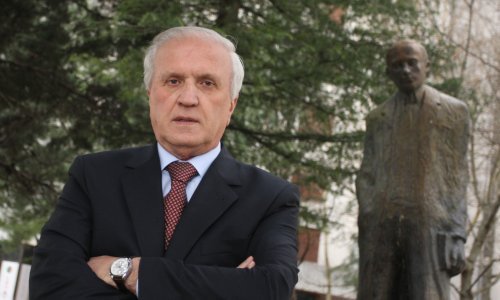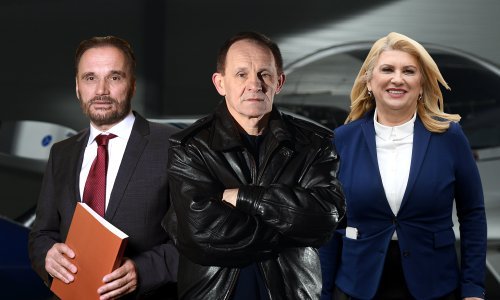The State Attorney's Office in Bosnia and Herzegovina said on Tuesday that conditions had been met for the extradition of Croatian war veteran Tihomir Purda to Serbia, while Purda and his defence attorney Josip Muselimovic strongly opposed this, warning that all evidence against Purda was collected in an unlawful manner and in violation of international legal standards.
Halil Lagumdzija, the judge of the State Court of Bosnia and Herzegovina presiding over today's hearing in the Purda case, said at the end of the hearing that after possible additional inquiries, he would forward to a panel of judges of the State Court for consideration his opinion on whether the request for Purda's transfer to Serbia was justified. However, the judge did not say when this could happen.
After the State Court decides on the case, the final decision rests with Bosnia's Justice Minister, who can accept or overturn the court's opinion.
For the first time since his arrest on January 5, Purda had the opportunity today to state his position on the case.
"I am against my extradition to Serbia," he said, adding that he was not responsible for the crime he was being charged with, and recalled that he had spent nine months in a Serb-run prisoner of war camp.
Purda said that like other Croatian prisoners he too had been subjected to various forms of torture, that he had been forced to eat pepper and salt, after which he would be forced to stand for twelve hours without being given any water. He said that he had been beaten with bats, that he had sustained injuries to his esophagus and back, and that he had been diagnosed with PTSD.
"We signed whatever they gave us to sign, just to avoid further torture," Purda told the judge.
The Serbian judiciary charges Purda with alleged participation in the murder of two members of the former Yugoslav People's Army (JNA) and the serious wounding of another during fighting in the Borovo Naselje section of Vukovar in 1991. In 2008, Serbian authorities issued a warrant through Interpol for Purda's arrest, and he was arrested based on that warrant upon entering Bosnia and Herzegovina in January this year. He has been in extradition custody in Bosnia and Herzegovina since.
The Bosnian prosecution did not deal with the content of Purda's case file, and Deputy State Attorney Jadranka Lokmic Misiraca today only said that legal requirements for Purda's extradition to Serbia had been met.
"We believe that there are no obstacles to his extradition," Lokmic Misiraca said, adding that Purda was charged with crimes that were punishable under Bosnian laws, that he was not a citizen of Bosnia and Herzegovina, that he was not facing the death penalty in Serbia, and that he was not wanted "for political, military or fiscal crime."
The Bosnian prosecutors believe that under such circumstances, all conditions envisaged by the European Convention on Extradition had been met.
Purda's attorney Josip Muselimovic said that Purda should not be extradited to Serbia because there was not a single piece of evidence that would support the charges against him cited in the Belgrade military court file of 1999.
Muselimovic cited parts of the file saying that after the conflict at Borovo Naselje on 5 November 1991, Petar Janjic, Danko Maslov and Tihomir Purda opened fire at a group of six JNA soldiers, killing two and seriously wounding one, who later died in the Vukovar hospital.
The identities of those killed were never established, the court said.
Muselimovic said that the investigation carried out by the Osijek County Prosecutor's Office had proven in detail that the accusations against Purda were unfounded because they had not been confirmed by any of the 30 witnesses interviewed during the investigation.
The witnesses confirmed only that Purda and other Croatian prisoners had been tortured while in Serb captivity, Muselimovic said, requesting the State Court of Bosnia and Herzegovina to release his client and turn down Serbia's request for his extradition.

































